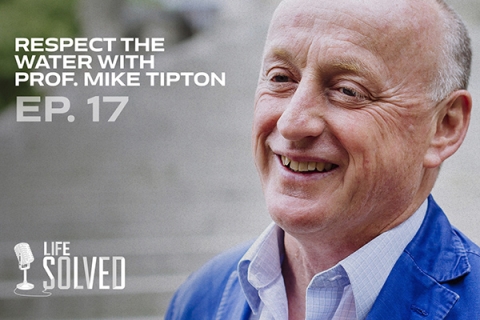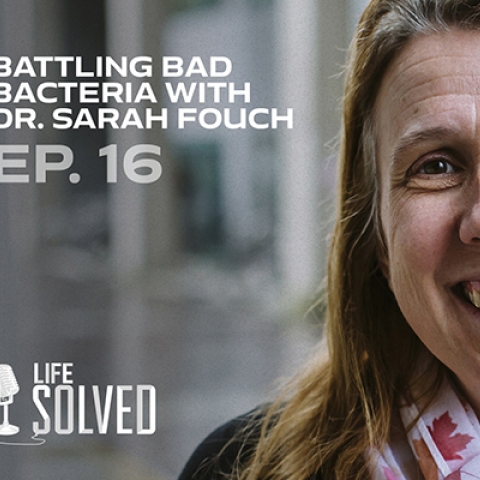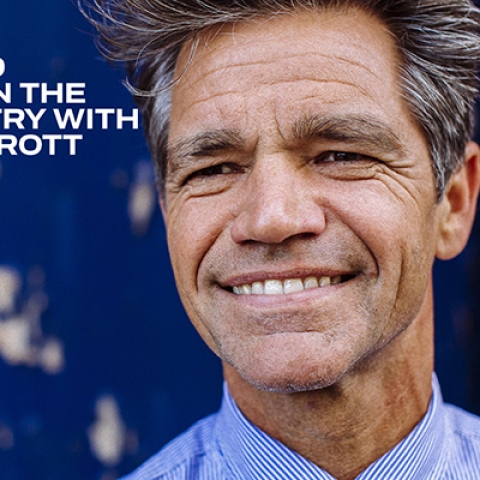

Professor Mike Tipton's getting the word out on staying safe in the water
15 min listen
What should you do if you find yourself drowning in cold water?
Drowning kills 320,000 people worldwide per year but Professor Mike Tipton says basic education in schools could transform this figure. He explains how he’s getting the word out on how to stay safe in the water.
You can listen to Life Solved on all major podcast players, whether via Apple, Spotify, Google Podcasts or other apps. Just search for 'Life Solved' and press the subscribe button.
More children drown than die in fires or die on a bicycle and yet we have cycle proficiency, we have fire training, we have adverts on national television about smoke detectors. You'll never see anything about television about drowning.
Professor Mike Tipton, Professor of Human and Applied Physiology
Episode transcript:
Narrator: You're listening to Life Solved from the University of Portsmouth. In this series, we hear about world-changing research from the brilliant minds at work here in Portsmouth. We also find out how that work is making a vital impact on human life.
Narrator: Drowning kills 320,000 people around the world each year. That's a conservative estimate from the World Health Organisation. In parts of Asia, it's a leading killer of children over the age of one. In the U.K., hundreds of lives are lost to drowning every year and yet, until recently, very little has been done to educate children and adults about how to behave when in trouble in water.
Mike Tipton: We will have bicycle proficiency in schools, we will have information on TV about fire protection, about having smoke detectors. So know, even if we only treat drowning prevention with that same level, I think it justifies having something in schools.
Narrator: The change came when campaign organisations began to work with researchers to challenge preconceptions about how our bodies behave in water.
Mike Tipton: And you still to this day will read newspaper articles where they'll say somebody fell in the water and died from hypothermia in four minutes. Well, the truth is, that's just a physical impossibility.
Narrator: Emma Fields spoke to Mike Tipton, Professor of Human and Applied Physiology, here at the University of Portsmouth about the research that's saving lives today.
Narrator: In this series, we often hear about research that had tantalising possibilities for human lives once it leaves the lab. Today's guest is Mike Tipton, whose findings are immediately helping campaigners for water safety change their public message.
Mike Tipton: The research group that I work with, which is the Extreme Environments Laboratory, have the remit to look at the physiological, pathophysiological and psychophysiological responses to extreme environments and the protection preparation and selection of people to go into those environments.
Narrator: In short, Mike looks at the body and mind in extreme places such as cold water. On this project, he explored people's preconceptions about water.
Mike Tipton: So when I started in the field of survival in the sea, it was dominated by, in particular, the Titanic. Over a century ago now, the Titanic went down and those that died in the ice-cold, flat, calm water almost certainly died from hypothermia. And so that created the perception that the problems associated with immersion in cold water, were to do with hypothermia. And that was reinforced during the Second World War. A large number of the Royal Navy deaths occurred in the survival phase. They, again, were in the water quite a long while, they had life jackets and floats. And so that perception that the problem associated with cold water immersion was hypothermia, you know, ingrained into the psyche. And you still to this day will read newspaper articles where they'll say somebody fell in the water and became h– died from hypothermia in four minutes. Well, the truth is, that's just a physical impossibility. It's not possible even for a naked individual in ice-cold water, who's an adult, to become hypothermic in less than about half an hour.
Narrator: Mike has been working in partnership with the Royal National Lifeboat Institution for over 20 years. At first, he did research on hypothermia in drowning victims before switching from rescue to prevention scenarios. But with the startling number of lives lost to drowning every year, Mike sees education as vital in changing people's understanding and behaviour in water.
Mike Tipton: A really important thing is to try and get this preventative messaging into people before they enter into a high-risk group. And if your high-risk group starts at about 14 or 15, it seems like a very good idea to get something to children at around about 13 or 14. And we've been trying to do that for some time. The rationale for it, of course, is there's one child a week drowning, there's more children dying in water than there are in fires or on bikes and yet, you know, we will have bicycle proficiency in schools, we will have information on TV about fire protection – about having smoke detectors. So, you know, even if we only treat drowning prevention with that same level, it justifies having something in schools. And it doesn't have to be a lot, we're not talking about, you know, great lectures about the moon and the sun and tides. We're just talking about a few, two or three safety messages that I call lessons for life, because the people who hear them, they may well save their life somewhere down the line. And we've got lots of evidence that that's the case from the 'Respect the Water' campaign.
Narrator: It seems remarkable that one school assembly might give children the knowledge to stay safe in water. So where did the idea of staying still and respecting the water come from?
Mike Tipton: The first experiments that I got involved with were to do with the initial responses to cold water immersion – as we called them then. And it was really looking at what a controlled immersion into cold water did in terms of your physiological responses. If you know the physiology, if you know that this cold shock response is maximal within the first 30 seconds to a minute, but is largely gone away by about 90 seconds, the sensible thing to do when you find yourself in cold water is to try and do as little as possible until you regain control of your breathing.
Narrator: Mike explained how he works with the RNLI to share the facts with wider society.
Mike Tipton: The first bit of work we did in terms of the RNLI's Respect the Water campaign back in 2014, was just trying to raise the profile of cold shock and get people to understand that it's not all about hypothermia. But then it became evident that around about half of the people who end up in cold water do so involuntarily. And so, therefore, there becomes an onus on telling them what to do if they happen to find themselves in the water. Yes, try not to fall in, but if you had no intention of going in anyway, then some advice on what to do if you do go in becomes important. So around about 2016/2017, we changed the emphasis on the Respect the Water campaign and we talked about perhaps floating first, suppressing your instinct, staying still until the cold shock response abated. That, I mean, was founded on experiments that we were doing back in the 80s, where we showed that if you put people into cold water and you allowed them to stay still for two minutes before they started swimming, they did much better than if they started swimming straight away. Because, of course, what the cold shock response is provoking is what's called the fight or flight response, which is very appropriate on land – it prepares you to fight or run away. But in cold water, it's a completely inappropriate response. So your natural instinct in that situation is to thrash about to try and swim hard, and it's completely the wrong thing to do because it significantly increases your chances of taking water into the airway.
Narrator: With various bodies working to tackle the problem from different angles, the Respect the Water campaign saw a huge drop in coastal drownings in some areas. But it wasn't the case that drowning just stopped. Looking at the demographics of people who passed away, lead Mike to change his focus for sharing information once again.
Mike Tipton: It was quite clear because of the, because the epidemiology of drowning statistics, that many of those that drown are young people – they're under the age of 40. And so there's two ways you can get at these individuals. One is to go into schools, so before they get into that dangerous age group of 15+, you can try and give them some water safety messaging, and we've done that. We've not only done that, we've done studies now to look at the impact of that water safety messages, not only in the short term but in the long term as well. So, I think we have probably the first evidence, that anyone has collected in this sort of area, of the benefit of actually engaging or providing water safety and messaging and teaching in schools.
Narrator: Targeting the most vulnerable age group is also informing Mike's research focus going forward.
Mike Tipton: I can guarantee that I could write scientific papers in esoteric journals for the rest of my life, and there won't be many in that range of people who are high-risk drowning who would read those, who read those articles. And that means having adverts. So we've had, for example, a Respect the Water campaign advert at the Victorious Festival, various clubs, various, I mean, there's been a Respect the Water campaign messaging up on the Big Screen in the Guildhall Square in Portsmouth. I have even written an article for the Lad Bible, which I have to be absolutely honest when they asked me to do it, I had no idea what the Lad Bible was. But we know that it was read by the right group of people, in fact, Lad Bible had been fantastic in terms of promoting water safety messaging to that particularly at-risk group.
Narrator: Mike's work with the RNLI has developed after more than two decades of collaboration. In that time he's done the research and helped apply it in lifesaving contexts; from how to address cold shock in helicopter water crashes to rescue and hypothermia treatment, all the way to marketing and education. This model of cutting edge research, working hand in hand with campaign groups and organisations who can implement it, offers a blueprint for success in real-world impact.
Mike Tipton: We've been very lucky over the years to work with some excellent groups such as Surf Life Saving GB, Coastguard, Fire and Rescue Services, etc., etc. The work we did with the RNLI went back years. We were working on the cold shock response and various things to do with surveillance because of course, if you know, people are going to get into trouble very quickly when they go into cold water, it puts a greater emphasis on prevention. So that was just one example of what I regard as the joy of what we do, and that's understanding the basic mechanisms and the basic physiology and then going through and working with some excellent end-users to come up with an answer. So all the way from mechanism to piece of kit is there is, as I say, the joy of human and applied physiology.
Narrator: The next phase involves working with local councillors and government to move the conversation in schools on from simply teaching children to swim.
Mike Tipton: So now this messaging is going out into schools in Hampshire. We're hoping that will be through a domino effect. When people see the value of it and the importance of it and understand the underlying statistics that, you know, that will then go from county council to county council. We've assessed children's water safety knowledge before they had their lesson, we've assessed it immediately after they've had their lesson and we've assessed it at least a month later. And the evidence seems to suggest that lesson gives children life-saving knowledge and that life-saving knowledge stays with them beyond the immediate acute period after the lesson.
Narrator: Where it's being used to save lives from drowning, Mike's work also has huge potential for application in other places. He told Emma about one of the other curious findings he'd like to investigate.
Mike Tipton: I mean, for years we've been doing lots of work on the sort of hazardous aspects of cold water immersion. But of course, there's also, in recent years, been a big upsurge in open water swimming – wild swimming – as partial treatment for various mental health conditions. We've been looking at so the beneficial side of cold water immersion and the claims made by people that, you know, 'I go into cold water', 'I feel as good as I've ever felt', 'I haven't had a cold for X number of months'. So something's happening but none of the underpinning, properly controlled science has really been done to elucidate the mechanisms by which being in cold water has a beneficial effect for mental health. We're doing another branch of this work is looking at its impact on migraines. So it's a fascinating area. But, you know, as scientists, what we want to do is drill in below the anecdotal evidence into the mechanistic evidence. To some extent, we're going the other way. We're starting with the end-user saying this is good and we're trying to get back to the mechanism.
Narrator: Mike explained the potential impact of his research into the psychology and physiology of cold water on all our lives.
Mike Tipton: I mean, we understand why people feel exhilarated and they feel alive after they've been in cold water because cold water, as I say, is part of the fight or flight response. You release a lot of adrenaline, you release a lot of the, all the stress hormones shoot up and 'course you feel alert because that's what it does. But, you know, stories about not being ill for a long while and all these inflammatory-related conditions that seem to get better, you know, that's deserving of some intervention, particularly if it's a strategy you can use that doesn't involve taking drugs.
Narrator: Next time on Life Solved: How smart packaging can actually reduce waste.
Paul Trott: The evidence is pretty dramatic that packaging is a powerful reducer of food. People need to be a bit careful when they're always arguing for less packaging.
Narrator: You can go back and listen to the rest of our episodes any time and follow our work at port.ac.uk/research.
Narrator: Our new magazine, Solve, follows University of Portsmouth research when it's put into practice. It's full of news and stories on our world-leading advances and the changes these are making to lives and futures across the world. Go to port.ac.uk/solve. And please do let us know what you think via social media using the hashtag Lifesolved or maybe just share the big idea with a friend. Thanks for listening.
Previous episode
Next episode
Discover more episodes
Episode 6: A sweet approach to battling bad bacteria
With antibiotic resistance on the rise, Dr Sarah Fouch and her team have been looking at alternative solutions. Listen now.
8 December 2020
18 min listen

Episode 8: Politics and Packaging in the Food Industry
Professor Paul Trott discusses innovative food packaging and how it can help tackle food waste problems. Listen now.
12 January 2021
17 min listen

